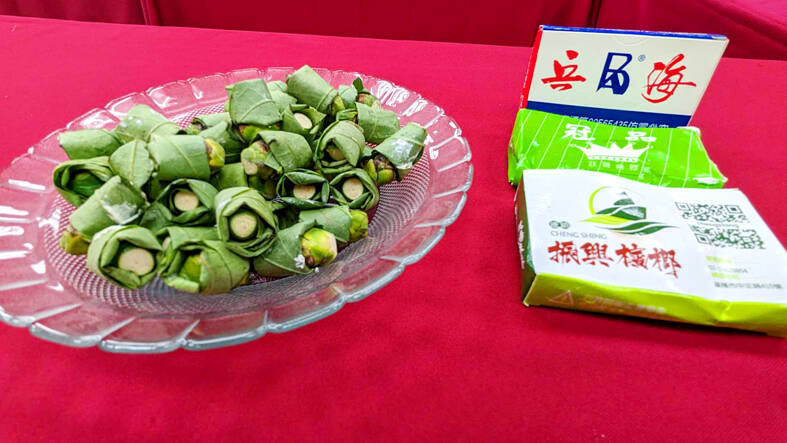More robust legislation, including higher fines, are required to stop betel nut vendors illegally selling to underage people, the Consumers’ Foundation said on Thursday, citing the results of its field tests.
The tests in Taiwan’s 22 administrative regions from July to last month collected data from 53 randomly selected betel nut stalls, foundation chairman Wu Jung-ta (吳榮達) told a media briefing at his office in Taipei.
The foundation sent a team with a young adult dressed in a high-school uniform to make purchases, Wu said.

Photo: Chen Wei-chi, Taipei Times
Of the 53 vendors, 30, or 56.6 percent, did not ask about age or check their ID before selling the team member betel nuts, he said.
In doing so, the vendors contravened Article 43 of the Protection of Children and Youths Welfare and Rights Act (兒童及少年福利與權益保障法), which prohibits supplying betel nuts to people aged under 18 and stipulates a fine of NT$10,000 to NT$100,000 (US$313.91 to US$3,139.12).
Betel nut kiosks in Pingtung, Yunlin, Hualien and Taitung counties, as well as in Keelung, failed the test by selling to the team member, while no vendors in Hsinchu City, Chiayi City, Tainan or Penghu County sold to the team, he said.
“Chewing betel nut is known to induce cancer and starting at a young age brings a higher risk of addiction,” Wu said. “It is a serious problem, as the government spends about NT$100 billion annually on cancer treatment and related costs, one-sixth of the National Health Insurance budget.”
The government should draft regulations specifically for the betel nut industry, including rules for where stalls can be set up and who can make purchases, he said, adding that fines should be increased to the levels of the Tobacco Hazards Prevention Act (菸害防制法).
“About 2 million people in Taiwan have a betel nut habit, which can lead to oral cancer, as well as dental problems,” said foundation financial officer Hao Sheng-po (侯勝博), who heads the otolaryngology department at Shin Kong Wu Ho-Su Memorial Hospital.
Betel nut is a stimulant that can lead to addiction, Hao said.
“It contains arecoline, arecaidine and n-nitrosamines, and releases oxyradicals and other toxins that can damage the respiratory system and lead to defects in the DNA,” he said. “It causes damage in the mouth and deformation of the teeth, and regular use for 20 years is associated with high risk of oral and esophageal cancer.”
In Taiwan, 8,000 people a year are diagnosed with oral cancer, with 3,000 dying annually, he said.
Foundation secretary-general Chen Ya-ping (陳雅萍) said that while regulations are meant to protect children, “the Control Yuan in a 2021 report reprimanded the Executive Yuan over a lack of effort to regulate sales and consumption of betel nut.”
“There has been no progress on the matter,” Chen said.
The government should enact regulations for the entire industry from betel nut plantations to distribution and sales, she said, adding that education and warnings are needed to establish a complete management system to safeguard the health of consumers.

Taiwanese can file complaints with the Tourism Administration to report travel agencies if their activities caused termination of a person’s citizenship, Mainland Affairs Council Minister Chiu Chui-cheng (邱垂正) said yesterday, after a podcaster highlighted a case in which a person’s citizenship was canceled for receiving a single-use Chinese passport to enter Russia. The council is aware of incidents in which people who signed up through Chinese travel agencies for tours of Russia were told they could obtain Russian visas and fast-track border clearance, Chiu told reporters on the sidelines of an event in Taipei. However, the travel agencies actually applied

New measures aimed at making Taiwan more attractive to foreign professionals came into effect this month, the National Development Council said yesterday. Among the changes, international students at Taiwanese universities would be able to work in Taiwan without a work permit in the two years after they graduate, explainer materials provided by the council said. In addition, foreign nationals who graduated from one of the world’s top 200 universities within the past five years can also apply for a two-year open work permit. Previously, those graduates would have needed to apply for a work permit using point-based criteria or have a Taiwanese company

The Shilin District Prosecutors’ Office yesterday indicted two Taiwanese and issued a wanted notice for Pete Liu (劉作虎), founder of Shenzhen-based smartphone manufacturer OnePlus Technology Co (萬普拉斯科技), for allegedly contravening the Act Governing Relations Between the People of the Taiwan Area and the Mainland Area (臺灣地區與大陸地區人民關係條例) by poaching 70 engineers in Taiwan. Liu allegedly traveled to Taiwan at the end of 2014 and met with a Taiwanese man surnamed Lin (林) to discuss establishing a mobile software research and development (R&D) team in Taiwan, prosecutors said. Without approval from the government, Lin, following Liu’s instructions, recruited more than 70 software

Taiwanese singer Jay Chou (周杰倫) plans to take to the courts of the Australian Open for the first time as a competitor in the high-stakes 1 Point Slam. The Australian Open yesterday afternoon announced the news on its official Instagram account, welcoming Chou — who celebrates his 47th birthday on Sunday — to the star-studded lineup of the tournament’s signature warm-up event. “From being the King of Mandarin Pop filling stadiums with his music to being Kato from The Green Hornet and now shifting focus to being a dedicated tennis player — welcome @jaychou to the 1 Point Slam and #AusOpen,” the